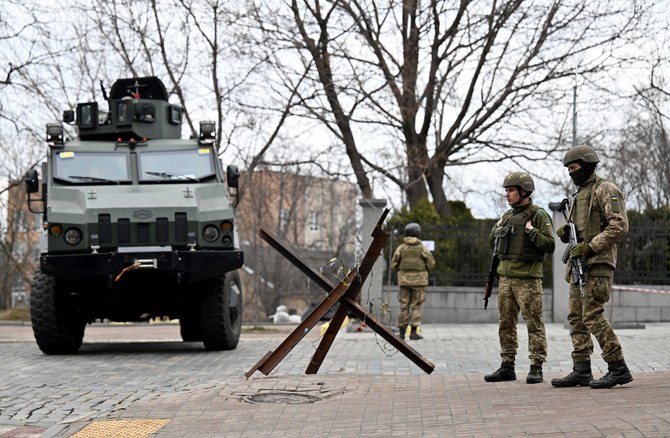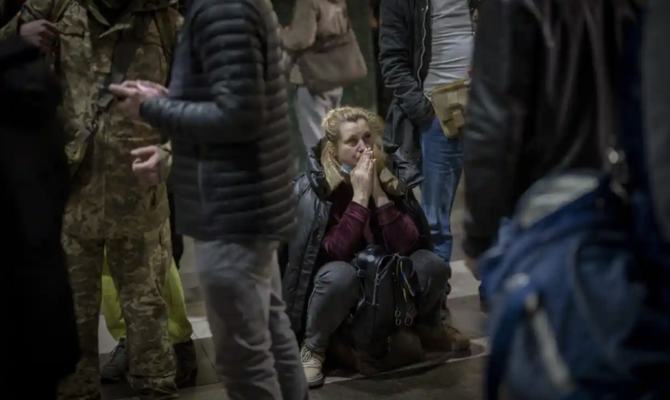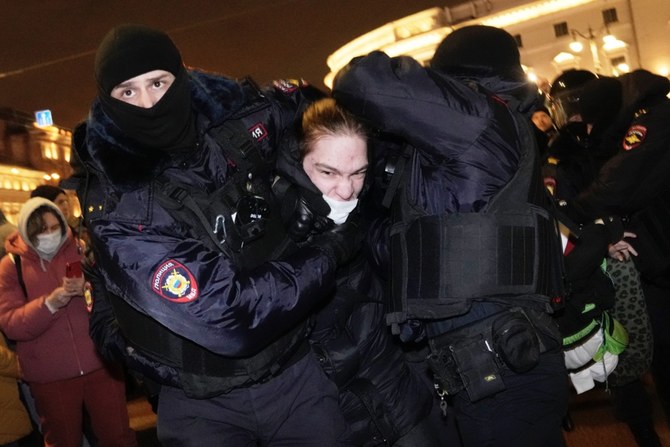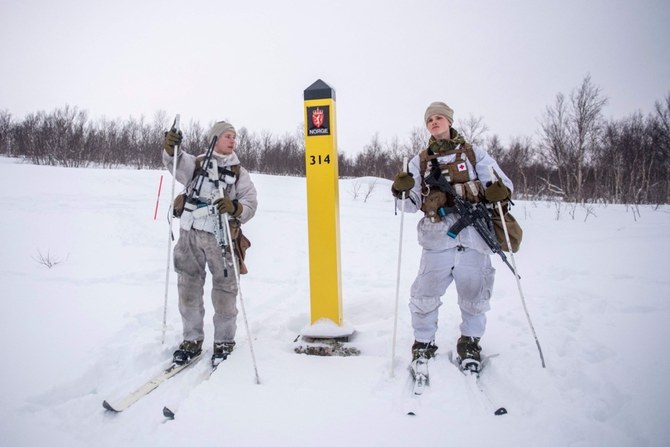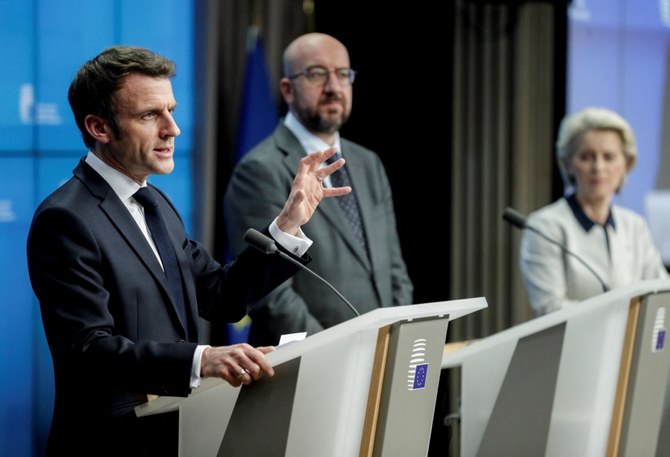DUBAI/LONDON/RIYADH/JEDDAH: Ukrainian forces were fighting for their country’s existence on Thursday after Russia launched a dawn invasion by land, sea and air in the biggest attack on a European state since the Second World War.
Russian missiles hit several Ukrainian cities as armored vehicles and columns of troops poured across the borders from Russia and Belarus to the east and north, and from the Black Sea, the Azov Sea and Crimea to the south.
A missile strike also hit a Ukrainian border post in the southeastern region of Zaporizhzhya, killing and wounding some guards, the border guard service said on Friday.
The region has no land border with Russia, which launched a military operation against Ukraine on Thursday, but is located on the coast of the Azov Sea which the neighbours share.
There was fierce fighting in the regions of Sumy and Kharkiv in the northeast, Kherson and Odessa in the south, and at the Hostomel military airport near Kyiv, where 20 Russian helicopters and aircraft landed paratroopers in an attempt to seize control.
In Kharkiv, Ukraine’s second-biggest city close to the Russian border, windows in apartment blocks shook from constant blasts. There were explosions in the southeastern port of Mariupol, near a frontline held by Russian-backed separatists in eastern Ukraine.
Civilians in Mariupol packed bags. “We are going into hiding,” one woman said.
In the southwestern Odessa region, 18 people were killed in a missile attack, and at least six died in Brovary, a town near Kyiv.
Ukraine’s military said it had destroyed four Russian tanks near Kharkiv, killed 50 troops near a town in the breakaway Lugansk region, and shot down six Russian warplanes in the east.
President Volodymyr Zelenskiy called on Ukrainians to defend their country and said weapons would be given to anyone prepared to fight.
“What we have heard today are not just missile blasts, fighting and the rumble of aircraft,” he said. “This is the sound of a new Iron Curtain, which has come down and is closing Russia off from the civilized world.
“Our national task is to make sure this curtain does not fall across our land. Russia has embarked on a path of evil, but Ukraine is defending itself and won’t give up its freedom.”
Zelenskyy said Russian forces were trying to seize the Chernobyl power plant, site of the world’s worst nuclear accident in 1986, and Russian shelling hit a radioactive waste repository.
Russian President Vladimir Putin said he had ordered “a special military operation … for the demilitarization and denazification of Ukraine.”
Putin warned Western countries not to intervene, with a reminder about Russia’s nuclear weapons.
“Russia’s response will be immediate and will lead you to such consequences as you have never before experienced in your history,” he said.
Late on Thursday, US President Joe Biden said Russia has launched an unprovoked assault on Ukraine and it was going largely as the US had predicted. Putin would become “a pariah on the international stage” after the invasion, Biden said.
Here is a live update of the main developments in Ukraine as they happen. (All timings are in GMT)
02:40 Explosions heard in the Ukrainian capital Kyiv.
02:31: New US sanctions hit Russian banks, elites; EU list cover financial, energy and transport sectors. Read here.
01:45: French President Emmanuel Macron said the Russian President Vladimir Putin wants to bring us back to age of empires and confrontations.
He held a “frank, direct and quick” phone call with the Russian leader on Thursday to ask him to stop military operations because the Ukrainian President Volodymyr Zelenskiy had asked him to.
The French president said there was duplicity on the part of the Russian president, but said it was important to keep the path open for dialogue with Putin.
Speaking at an emergency EU summit in Brussels, Macron said that the bloc was more than just a market of consumers and needed to be a power with energy and defense sovereignty.
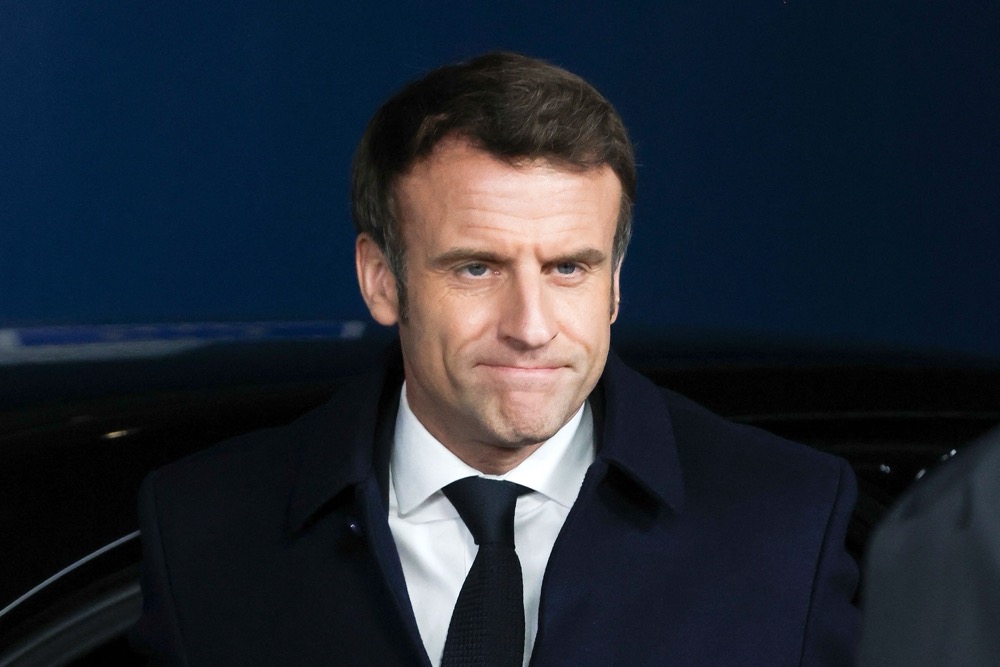
France’s President Emmanuel Macron arriving for an emergency European Union summit. (AFP)
01:40: The President of the European Commission Ursula von der Leyen says steps agreed by EU leaders in reaction to the Russian invasion of Ukraine include financial sanctions, targeting 70% of the Russian banking market and key state owned companies, including in defense. She said the EU will hold the Kremlin accountable.
00:29: Prime Minister Morrison said that Australia will impose further sanctions on Russian individuals.
He also said that its is unacceptable that china is easing trade restrictions with Russia at this time.
00:24, Friday Feb. 25: US Treasury added five more Russian banks to the sanctions list including country's the two largest, both majority owned by the government, although each faced penalties with differing severity.
23:56: Ukraine's president said Friday his country had been left on its own to fight Russia.
President Zelensky said in a speech addressing the nation, “We have been left alone to defend our state.”
He added, “Who is ready to fight alongside us? I don't see anyone. Who is ready to give Ukraine a guarantee of NATO membership? Everyone is afraid.”
23:50: The White House is expressing outrage at “credible reports” from Ukrainian officials that the staff at the Chernoybl nuclear plant have been taken hostage by Russian troops.
Press secretary Jen Psaki said Thursday that “we condemn it and we request their release.”
23:47: Prime Minister Fumio Kishida said on Friday that Japan will strengthen sanctions against Russia to three areas including financial institutions and military equipment exports.
He added that Japan will also do the utmost to limit the economic impact to Japan from the fall-out from the Ukraine crisis.
Finance Minister Shunichi Suzuki said Japan will freeze assets in some Russian banks as part of sanctions against its action in Ukraine.
23:30: Here is a map of the military action across Ukraine on the first day of the Russian invasion.
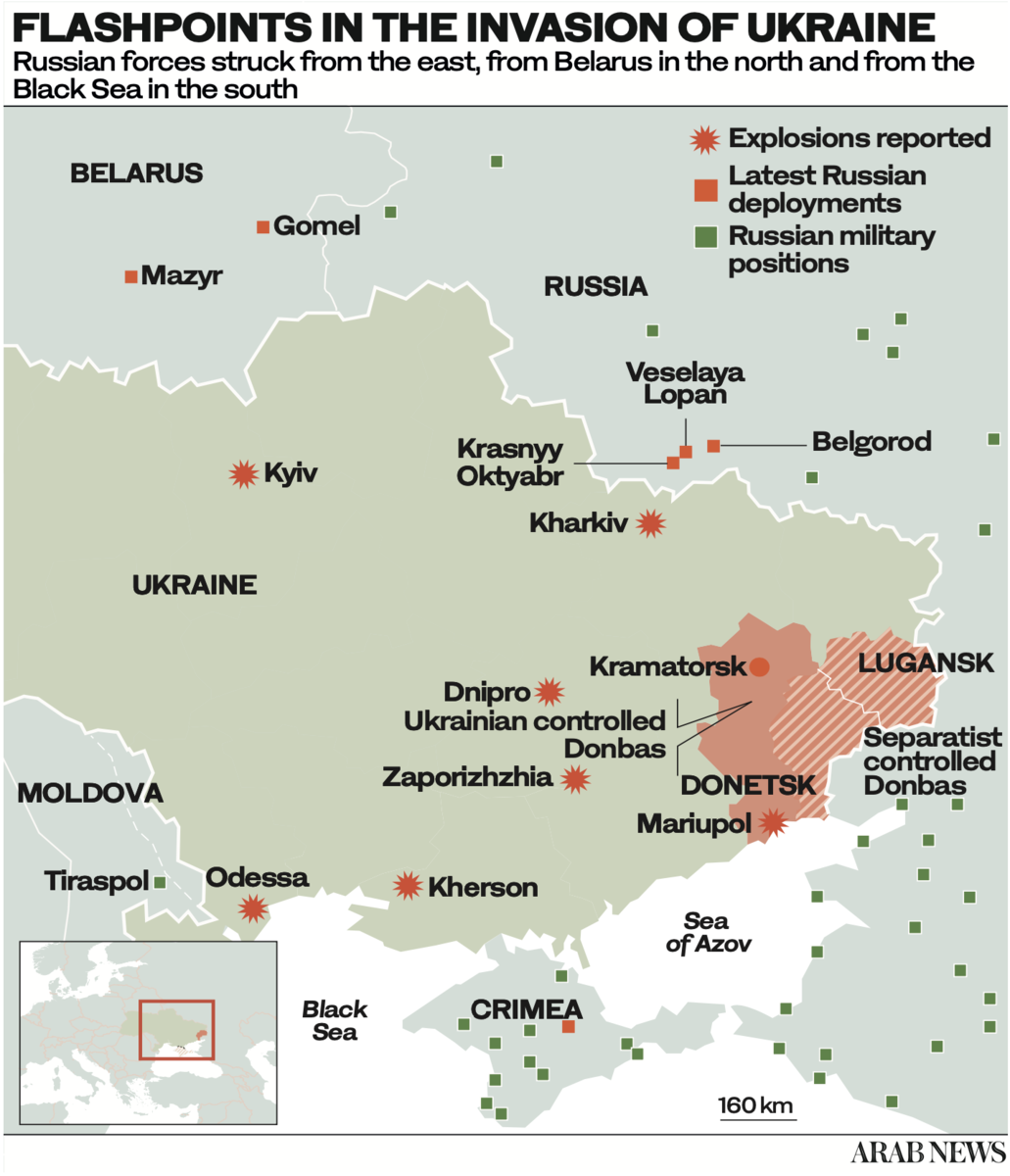
23:15: Russian ‘sabotage groups’ are the Ukrainian capital, Kyiv, president says.
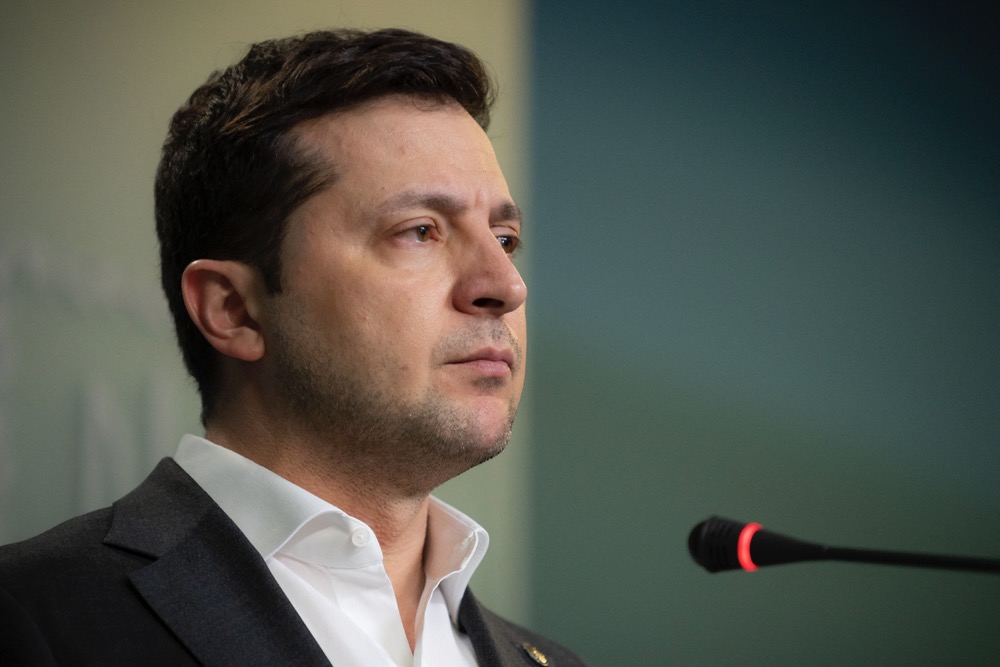
President Volodymyr Zelensky signed a decree ordering a general mobilisation. (AFP)
22:45: Ukraine’s President Volodymyr Zelensky says 137 dead after first day of fighting.
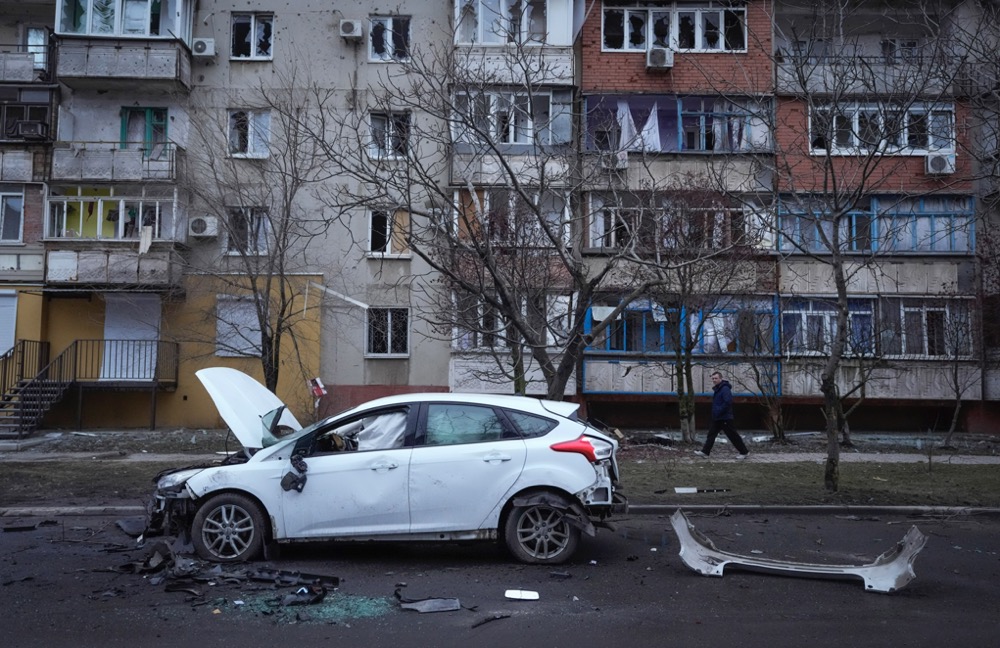
A man walks past a damaged vehicle and debris following Russian shelling in Mariupol, Ukraine, Thursday, Feb. 24, 2022. (AP)
22:45: Ukraine’s President Volodymyr Zelensky signed a decree ordering a general mobilization. Conscripts and reservists in all regions will be called up. The decree will be in effect for 90 days.
22:40 - The US still has room for further sanctions if Russia escalates aggression in Ukraine, a Senior US administration official has said, Reuters reports.
21:40 - The World Health Organization says it has released $3.5 million from its contingency fund for emergencies to purchase and deliver urgent medical supplies for Ukraine.
21:10 - After having spoken to Ukraine’s president and consulted with him, French President Emmanuel Macron called Vladimir Putin to demand an immediate end to Russian military operations, according to the Elysee.
The Kremlin said the wwo leaders agreed to stay in contact.
20:50 - The UN Secretary General Antonio Guterres said Thursday that the conflict was wrong and unacceptable under the UN’s charter but it is still possible to change course and reverse the decision. More here.
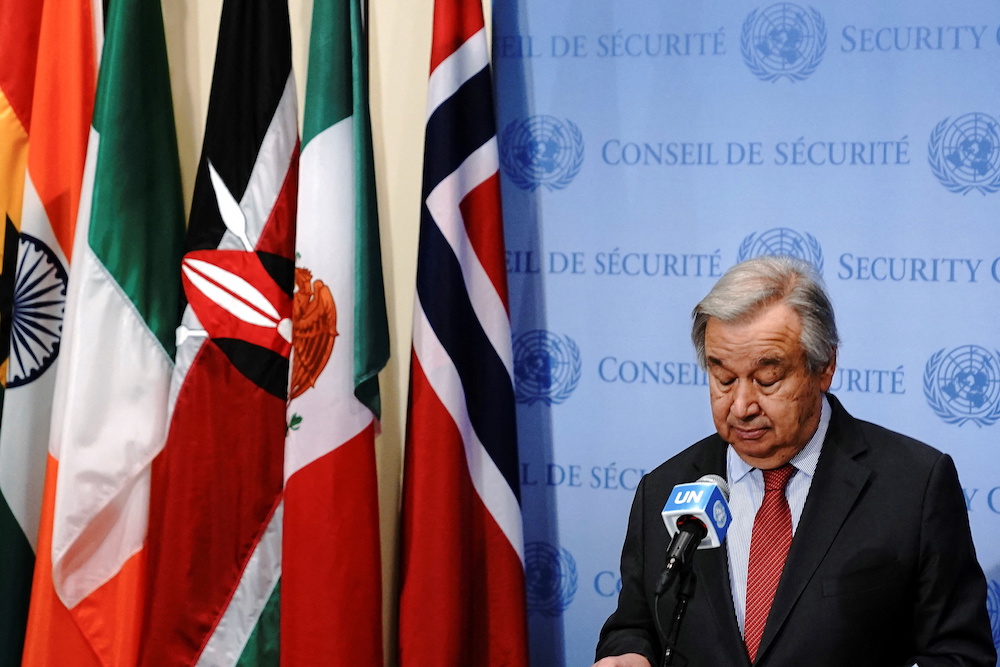
Guterres makes a statement as he speaks to the media at UN headquarters in the Manhattan borough of New York City. (Reuters)
20:30 - The UN’s human rights chief Michelle Bachelet on Thursday called on Russia to immediately halt its military assault on Ukraine, which she said violates international law and endangers countless civilian lives. Full story here.
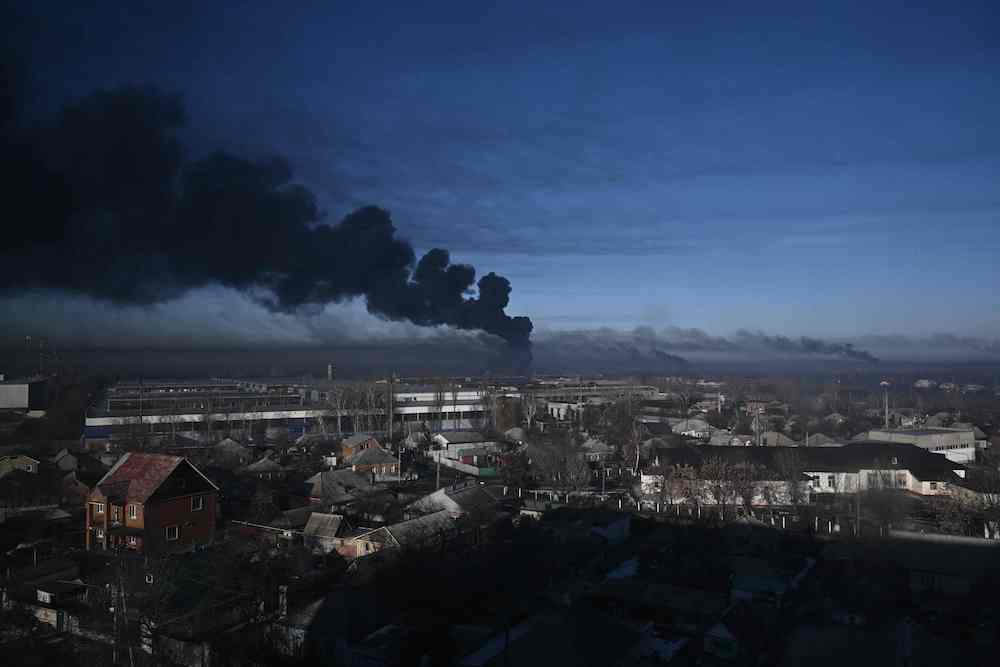
There were reports from early Thursday morning of military strikes close to densely populated major cities including Kharkiv, Kramatorsk, Odesa, Mariupol and the capital, Kyiv. (Reuters)
20:15 - Ukraine’s operational nuclear power plants are running safely and there has been no “destruction” at the remaining waste and other facilities at Chernobyl, the UN nuclear watchdog said on Thursday, citing Ukraine’s nuclear regulator. Full story here.
19:43: Ukraine's Health Minister Oleh Lyashko said 57 people had been killed and 169 wounded on Thursday.
19:43: Ukraine has requested an urgent debate be held at the U.N. Human Rights Council on the situation stemming from the 'Russian aggression', the United Nations said.
19:43: The United States' sanctions over Russia's invasion of Ukraine include 24 Belarusian individuals and entities over their support for Moscow's attack, the U.S. Treasury Department said.
The U.S. sanctions target two state-owned banks -- Belinvestbank and Bank Dabrabyt -- as well as Belarus' defense and security industries and defense officials, Treasury said. They target Aliaksandr Mikalaevich Zaitsau, a former Belarusian government official and a member of Belarusian leader Alexander Lukashenko’s inner circle, the department said.
19:37: The European Central Bank discussed the possible consequences of war in Ukraine when it met for a previously-scheduled meeting in Paris, ECB President Christine Lagarde said in a Tweet.
19:35: A Russian AN-26 military transport aircraft crashed in Russia's southern Voronezh region, killing its crew on board, Interfax news agency quoted Russian military officials as saying.
19:32: The United States imposed an array of sanctions on Russia's two largest financial institutions and multiple individuals linked to the Kremlin after Moscow's invasion of Ukraine, the Treasury Department said.
19:22: The United States will deploy 7,000 more troops to Europe, to be based in Germany, the Pentagon announced.
"They will deploy to Germany to reassure NATO Allies, deter Russian aggression and be prepared to support a range of requirements in the region," a Pentagon official said, adding that they are expected to depart "in the coming days."

EU leaders gather during a round table meeting at an extraordinary summit on Ukraine at the European Council building in Brussels, Thursday, Feb 24, 2022. (AP)
19:18: The World Bank and International Monetary Fund said they were working to keep their remaining employees in Ukraine safe amid a Russian invasion while the institutions' leaders assess the conflict's impacts.
19:17: Iranian President Ebrahim Raisi told Russian President Vladimir Putin in a phone call that NATO's expansion was a "serious threat" to the region's security and stability, the semi-official Nour News reported.
"NATO's expansion eastward creates tension and is a serious threat to the stability and security of independent states in various areas," Raisi was quoted saying.
"I hope what is happening will benefit peoples and the entire region," he said.
19:10: Several thousand Ukrainians have crossed into neighbouring countries, mainly Moldova and Romania, while an estimated 100,000 have fled their homes and are uprooted in the country after Russia's invasion, the U.N. refugee agency said.
19:09: The United States has expelled Russia’s second-ranking diplomat in Washington in retaliation for the Russian expulsion of the No. 2 U.S. diplomat in Moscow earlier this month, a senior State Department official said.
19:07: US President Joe Biden said that a set of sanctions on Russia do not include banning the country from the SWIFT banking system for now.
19:06: Meta Platforms Inc, which owns Facebook, has set up a special operations center to monitor the conflict in Ukraine, and it launched a feature so users in the country can lock their social media profiles for security, a company official said in Twitter posts.
18:52: US President Joe Biden said that Russia has made an unprovoked assault on Ukraine and it is going largely as the US predicted.
18:44: France recommended that its citizens in Ukraine remain indoors given the risk of travel in the country, the Foreign Ministry said, and also warned against all travel to Ukraine until further notice
18:39: UN Secretary-General Antonio Guterres said the world body was scaling up its humanitarian operations in Ukraine and the protection of civilians must be the top priority.
He allocated $20 million from a UN emergency fund to meet urgent humanitarian needs in Ukraine.
18:30: Pan-European rights body the Council of Europe said it would consider sanctions against Russia and permanent representatives of its 47 member states would meet Friday to examine “the measures to be taken in response to the serious violation” by Russia of its obligations.

President Joe Biden calls on reporters for questions while speaking about the Russian invasion of Ukraine in the East Room of the White House, Feb. 24, 2022, in Washington. (AP)
18:28: Canada announced more sanctions against Russia, targeting 62 individuals and entities, including members of the Russian elite and major Russian banks, and canceling all export permits, after Moscow launched an all-out invasion of Ukraine.
18:25: The Organization for Security and Cooperation in Europe said it was temporarily evacuating all international mission members from Ukraine as soon as possible.
18:24: The African Union condemned Russia’s attack on Ukraine and called for an “immediate cease-fire,” saying the situation risked escalating into “a planetary conflict.”
The bloc’s current chair, Senegalese President Macky Sall, and Moussa Faki Mahamat, chair of the African Union Commission, said in a joint statement they were “extremely concerned” by the invasion.
18:21: Belgian Prime Minister Alexander De Croo said: “We don’t need sanctions that bark, we need sanctions that bite, that have a big impact on the Russian side.”
He added: “We need to make it extremely difficult for them to operate in the international environment.”
18:14: Russia’s Aeroflot was banned from flying to the United Kingdom and the UK Civil Aviation Authority said it had suspended Aeroflot’s foreign carrier permit.

A damaged vehicle and debris following Russian shelling outside outside Mariupol, Ukraine, Thursday, Feb. 24, 2022. (AP)
18:08: FIFA president Gianni Infantino said he was “concerned” by “the tragic and worrying” situation.
Russia is due to host a 2022 World Cup play-off with Poland on March 24 and if victorious another on March 29 against the winners of the Czech Republic and Sweden — although those federations have demanded the matches be moved.
18:02: Russian President Vladimir Putin will be hit personally with sanctions by the United States, a Bloomberg reporter said on Twitter, citing Senator Sherrod Brown.
17:59: The outskirts of Ukraine’s port city of Mariupol came under heavy fire and hundreds of explosions have been observed there, a diplomatic source told Reuters, as Ukrainian forces battled Russian invaders on three sides.
17:53: US President Joe Biden said G7 leaders had agreed to move forward on “devastating packages of sanctions” and other economic measures.
“This morning, I met with my G7 counterparts to discuss President Putin’s unjustified attack on Ukraine and we agreed to move forward on devastating packages of sanctions and other economic measures to hold Russia to account,” Biden said in a tweet.
This morning, I met with my G7 counterparts to discuss President Putin’s unjustified attack on Ukraine and we agreed to move forward on devastating packages of sanctions and other economic measures to hold Russia to account. We stand with the brave people of Ukraine. pic.twitter.com/dzvYxj7J9w
— President Biden (@POTUS) February 24, 2022
17:52: Britain announced a package of concessions to help Ukrainians in the UK, relaxing rules to help them temporarily extend or switch their visas.
17:44: Lebanon condemned Russia’s invasion of Ukraine and called on Moscow to halt its military operations at once, withdraw its troops and return to dialogue and negotiations as a means to resolve the conflict, a statement by the Foreign Ministry said.

People hold placards, Ukraine flags and a Union flag as they attend a demonstration outside Downing Street, in London, Thursday, Feb. 24, 2022. (AP)
17:34: The Chernobyl nuclear power plant has been captured by Russian forces, an adviser to the Ukrainian presidential office, Mykhailo Podolyak, said.
17:33: Russian police have detained more than 700 people at anti-war protests across Russia.
17:32: Indian Prime Minister Narendra Modi spoke with Russian President Vladimir Putin by phone and called for an “immediate cessation of violence,” Modi’s office said in a statement.
“(Modi) reiterated his long-standing conviction that the differences between Russia and the NATO group can only be resolved through honest and sincere dialogue,” the statement said.
17:29: Russia gave its first confirmation that its ground forces have moved into Ukraine, saying troops entered from Crimea.

A column of Russian army trucks approach a checkpoint on the Ukrainian border. (TASS)
17:18: Britain said it would sanction several Russian oligarchs and elites including President Vladimir Putin’s former son-in-law Kirill Shamalov.
British Prime Minister Boris Johnson announced sanctions on over 100 Russian individuals and entities.
17:16: German Chancellor Olaf Scholz warned that Russia’s invasion of Ukraine must not be allowed to spread to other parts of Europe, as he vowed that NATO will defend its member states.
17:12: British Prime Minister Boris Johnson said Russian banks would be excluded from London’s financial system as part of further sanctions.
“These powers will also enable us to ban Russian state and private companies from raising funds in the UK, banning dealing with their securities, and making loans to them. We will limit the amount of money the Russian nationals will be able to deposit in their UK bank accounts.”
17:06: British Foreign Secretary Liz Truss berated Moscow’s ambassador over his country’s invasion of Ukraine, calling Russia an international pariah before kicking him out of the meeting, sources said.
16:58: Russian President Vladimir Putin said that Moscow had no other choice but to invade Ukraine to ensure Russia’s security.
“What was happening left us with no choice,” the Russian leader said during a televised meeting with business representatives, adding that “we had no other way of proceeding.”

Ukrainian servicemen pictured near the frontline in Luhansk region. (AFP)
16:51: Russian police detained at least 389 people at anti-war protests that took place in 39 Russian cities, the OVD-Info protest monitor said.
16:50: A spokesperson says Canada’s Foreign Minister Melanie Joly summoned Russia’s ambassador in Ottawa to condemn in the strongest possible terms Russia’s egregious attack on Ukraine.
16:40 - President Putin said Russia remained a part of the global economy and did not plan to damage the system that it belongs to. He said Russia's global partners should understand that and should not push the country out from this system.
He remarked that there was “no other way” to defend Russia other than invading Ukraine.
16:39: Sweden has moved all its embassy staff in Ukraine to Poland, Foreign Minister Ann Linde said on Thursday.
“The Russian military attack on Ukraine and the sharply deteriorating security situation mean that Sweden, like other countries, has decided that all deployed embassy personnel will temporarily leave Ukraine. The embassy staff is now safe in Poland,” she said in a tweet.
16:36: The United Nations Security Council is expected to vote on Friday on a US-drafted resolution that condemns Russia for invading Ukraine and requiring Moscow to ‘immediately, completely, unconditionally,’ withdraw from Ukraine, a senior US administration official said.
16:30 - Russia’s foreign ministry says the US has told Moscow that the White House does not intend to hold talks on security guarantees, according to an Ifax statement.
16:20 - Ukraine has demanded the world banish Russia from the SWIFT banking system, meanwhile the G7 said in a statement it was “ready to act” on potential disruptions of energy supply after its meeting this afternoon.
16:15 - Ukraine’s ambassador to the US has called for massive sanctions and military assistance to defend the country, as well as humanitarian assistance from its allies, while adding that it was not just the Ukrainian military fighting against invastion but “all Ukrainians.”
16:14: India is focusing on evacuating its 16,000 nationals still stuck in Ukraine, the South Asian nation’s foreign secretary told reporters late on Thursday after Russian forces mounted a mass assault by land, air and sea.
16:07: Moscow vowed to respond in kind to “unfriendly” European Union sanctions imposed over Russia’s invasion of Ukraine.
“In accordance with the principle of reciprocity, which is fundamental to international law, we will take tough retaliatory measures,” the foreign ministry said in a statement.
16:06: Civilians and critical infrastructure such as water and power systems in Ukraine must be protected from attacks in line with the rules of war, the International Committee of the Red Cross (ICRC) said.
ICRC President Peter Maurer, in a statement said: “The use of weapons with wide area effects should be avoided in populated areas.
16:05: Japan plans to compile stringent sanctions on Russia in the areas of finance and export controls following the Russian invasion of Ukraine, and will announce them on Friday, Prime Minister Fumio Kishida said.
16:00 - Kyiv's Mayor Vitaliy Klitschko has announced a city-wide curfew to be in place overnight.
“Friends! Kyiv is introducing a curfew from today. It will be in force between 22:00 and 07:00,” the former heavyweight boxer said.
“It is necessary for the safety of the capital's residents amid military aggression and with martial law in force,” Klitschko added.
15:50 - Ukrainian President Zelenskiy said Ukraine was listening to the sound of a new iron curtain falling as Russian troops advanced across his country's territory and he warned that other European countries may be next.
“What we have heard today are not just missile blasts, fighting and the rumble of aircraft. This is the sound of a new iron curtain, which has come down and is closing Russia off from the civilised world,” Zelenskiy said.
“Our national task is to make sure this curtain does not fall across our land.”
15:43: IMF Managing Director Kristalina Georgieva warned the conflict in Ukraine will have repercussions for the global economic recovery.
Following Russia’s invasion of its neighbor, Georgieva said on Twitter she was “deeply concerned,” and cautioned that the fighting “adds significant economic risk for the region & the world.”
15:34: The United States deployed F-35 fighter jets to Estonia and Lithuania and extended the stay of its existing troops in the region, the Lithuanian defense ministry said.
15:33: All United Nations staff in Ukraine are safe and some are being relocated, but a core group remains in the country’s east, UN spokesman Stephane Dujarric said.
There around 1,500 UN staff in Ukraine, Dujarric said.

People have been taking shelter in train and metro stations in the capital Kyiv. (AFP)
15:30 - A senior US defense official said Russian forces are making a move on Kiev and that their assaults were designed to take main population centres, with cruise, surface-to-air, and sea-launched missiles used.
The US added it does not believe the full-scope of Russian electronic warfare capabilities have come into play, but that “they may yet.”
15:28: The Vatican, in its first comment on Russia’s invasion of Ukraine, said it hoped that those who hold the destiny of the world in their hands would have a “glimmer of conscience.”
15:20: The OSCE’s acting chairman, Polish Foreign Minister Zbigniew Rau, slammed Russia’s invasion of Ukraine as a “crime against humanity.”
“We condemn in the strongest possible words this act of aggression,” he told a meeting, saying Russia justifying “this crime against humanity is deplorable and shameful.”
15:17: Switzerland will tighten its economic measures against, President Ignazio Cassis said.
The government would adjust its regulations so Switzerland could not be used to circumvent sanctions imposed by the European Union, Cassis told a news conference in Bern.
15:15 - A senior EU official said that the Russian financial, energy and transport sectors will be hit by new sanctions. There will also be export bans. They also said they would be targeting oligarchs within President Putin's inner circle.
15:00: Moldova’s government will ask parliament to declare a state of emergency for 60 days, the prime minister said.
The parliament is expected to hold an unscheduled meeting later on Thursday.
15:00: Ukrainian President Volodymyr Zelenskyy says Russian forces are trying to seize the Chernobyl nuclear plant.
Zelenskyy said on Twitter that “our defenders are giving their lives so that the tragedy of 1986 will not be repeated.” He added that “this is a declaration of war against the whole of Europe.”
14:40: Denmark will increase its contributions to NATO forces by deploying around 200 soldiers to Estonia as well as two F-16 fighter jets to perform aerial policing in Poland’s air space, the government said.
The decisions would need parliamentary approval, which the government will seek later on Thursday.
14:40 - Russia’s foreign ministry said the Kremlin would respond to European and US sanctions in a "tit-for-tat" manner.
14:35: The European Union has summoned Russia’s ambassador to the EU to demand an immediate end to Russia’s military actions in Ukraine, the EU’s diplomatic service (EEAS) said.
In the meeting with the ambassador, the EU conveyed its “strongest condemnation of the unprovoked, unjustified invasion of Ukraine and the demand to cease military operations immediately, and unconditionally withdraw all forces and military equipment from the entire territory of Ukraine,” the EEAS said.
14:30: Spanish Prime Minister Pedro Sanchez warned the country would take an economic hit from the shockwaves caused by Russia’s invasion of Ukraine and the sanctions imposed by the West, particularly in energy markets.
“We will take whatever measures are necessary to mitigate the economic impact, including the energy impact, of this crisis on Spanish society,” he said during a televised address in Madrid.
14:30 - UEFA are to hold an emergency meeting on Friday to “evaluate the situation” concerning Russia’s invasion of Ukraine with the former set to host the Champions League final in Saint Petersburg in May. Full story here.
14:25 - World leaders are continuing to condemn the actions of Russia in Ukraine, with the Danish prime minister saying they expected the Russian invasion of Ukraine to be the start of a long international crisis, and Spanish PM calling it an "attack on peace and solidarity that has brought prosperity to Europe," while pledging financial and medical support to Ukraine.
14:20 - The Ukrainian army said battles were under way for airbase near Kyiv, while the city's mayor said four metro stations do not have trains running so they can be used as air raid shelters.
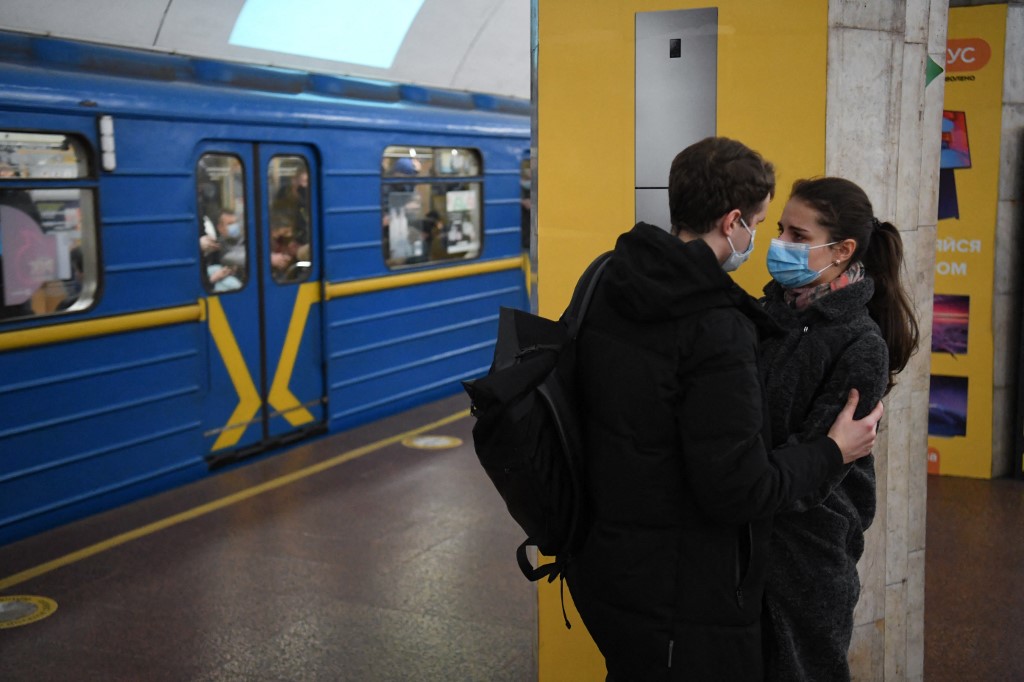
A couple speaks with each other at a metro station in Kyiv early on February 24. (AFP)
14:15 - The Ukrainian foreign minister said on Thursday afternoon that Putin was immersing Europe in the darkest time since 1939, and that the West had to assist with tough sanctions, and by providing Ukraine with military and financial support.
Germany has said sanctions are already in place to “dramatically limit” Russian access to EU, US markets. The German defense minister also said Berlin was ready to comply with further NATO requests.
14:10 - Russia says it has destroyed over 70 military targets, including 11 airfields.
14:05 - Europe's aviation regulator expanded a safety warning, advising airlines to “exercise caution” when flying through parts of Russian airspace controlled by regional centers in Moscow and Rostov.
In an updated bulletin the European Union Aviation Safety Agency (EASA) cited “heightened military activity (and) risk of missiles penetrating into controlled airspace.”
14:00 - Ukrainian President Zelensky says his country is waiting for concrete sanctions against Russia from allies, but having spoken to many of their leaders, confident of forming an alliance against Russian President Putin.
13:45 - Russia's foreign minister said he had held tense talks with representatives from the US and NATO, adding that Moscow was always ready for dialogue based on the principles of international law.
13:35 - Saudi Arabia’s embassy in Kiev called on all Saudi citizens in Ukraine who did not contact it during the previous evacuation period to contact it as soon as possible. Full story here.
13:14: Soldiers were seen raising the Russian flag over the Ukrainian Kakhovka Hydroelectric Power Plant.
12:00: Qatar Airways temporarily suspends all flights to Ukraine.
12:00: Advisor to Ukraine’s presidential office says fighting is taking place along practically the entire Russian-Ukraine border.
12:00: British Prime Minister Boris Johnson says the west will impose “massive sanctions” against Russia as it continues in it invasion of Ukraine.
11:56: NATO puts warplanes on alert, to increase troop presence on eastern flank. But NATO Secretary General Jens Stoltenberg says they have no plans to troops to Ukraine.
11:49: Footage from Ukraine appears to show a downed Russian military helicopter.
11:49: Other footage also shared on social media appears to show Russian military helicopters flying over residential areas of Ukraine.
11:43: Russian helicopters attack a military airport near Kiev, according to Ukrainian border guards.
11:32: NATO Secretary General Jens Stoltenberg says Russia has launched a war on Ukraine and shattered peace on the European continent.
11:25: Senior Chinese diplomat, Wang Yi, says he understands Russia’s concerns over security issues.
11:22: Three Russian helicopters downed by Ukraine, according to Ukraine Internal Ministry official.
11:12: Kremlin says “Nobody is talking about occupation of Ukraine” adding that the word is unacceptable.
11:03: 2 Russian civilian cargo ships hit by a Ukrainian missile strike in the Azov sea, casualties reported.
11:02: The headquarters of Ukrainian intelligence in Kiev falls under missile attack.
10:56: Portugal’s Prime Minister Antonio Costa says their country will welcome Ukrainians fleeing the Russian invasion.
10:45: The British government has summoned the Russian ambassador, and confirms it is preparing a ‘harsh package’ of sanctions.
10:40: Red Cross, Gail McGovern, says all sides in Ukraine conflict must respect international humanitarian laws, protect civilians and essential services.
10:35: The current situation is not a Russian invasion of eastern Ukraine but a comprehensive attack, says Ukraine’s foreign minister Dmytro Kuleba.
10:17: Israel’s foreign minister Yair Lapid says his country condemns the Russian attack on Ukraine.
10:14: Witness reports say explosion heard in Ukraine’s capital Kiev
10:01: More than 40 Ukrainian soldiers and around 10 civilians killed says country’s presidency Volodymyr Zelenskyy.
09:57: Germany offers extensive help to Poland in preparation for possible Ukraine refugee influx.
09:54: Iran’s foreign minister Amirabdollahian says the Ukraine crisis was caused by NATO provocations: Twitter.
09:49: As shelling continues Russian military tell Ukrainian civilians they have ‘nothing to fear’
09:40: A boy is killed in the shelling of an apartment block in the Kharkiv region in eastern Ukraine.
09:35: Ukrainian President Volodymyr Zelenskyy says his country broke off diplomatic relations with Russia.
09:01: Germany says European Union will launch the ‘most massive sanctions’ against Russia.
08:48: The Ukrain military says about 50 Russians have been killed and 6 planes destroyed in eastern Ukraine
08:42: Lithuania declares a state of emergency as Russian invasion of Ukraine continues.
08:32: Ukraine police say they will distribute weapons to veterans.
08:31: Belarus leader says his army not taking part in Ukraine invasion.
08:04: Explosions are heard in the east Ukrainian city of Kharkiv.
07:54: Ukrainian President Zelensky calls for European ‘unity’ in call with French President Emmanuel Macron
07:34: Iran urges its citizens in Ukraine to leave the country.
07:18: Australia announces ‘second phase’ of sanctions against Russia.
07:17: Russian-backed separatists say they downed 2 Ukrainian drones.
07:15: Russian ruble falls 9% against dollar after Russia’s attack on Ukraine.
07:15: Ukraine says at least 7 people have killed by Russian shelling and 9 wounded.
06:55: Denmark closes its embassy in Kiev.
06:53: French President Emmanuel Macron condemns the Russian invasion in a tweet.
06:44: Casualties reported in Brovary in the Kyiv region, according to Ukraine interior ministry advisor.
06:43: Low cost airline Wizz Air suspends all operations in Ukraine.
06:42: Japan’s Prime Minister, Fumio Kishida, says the Russian attack ‘shakes foundation of international order.’ Read the story in Arab News Japan
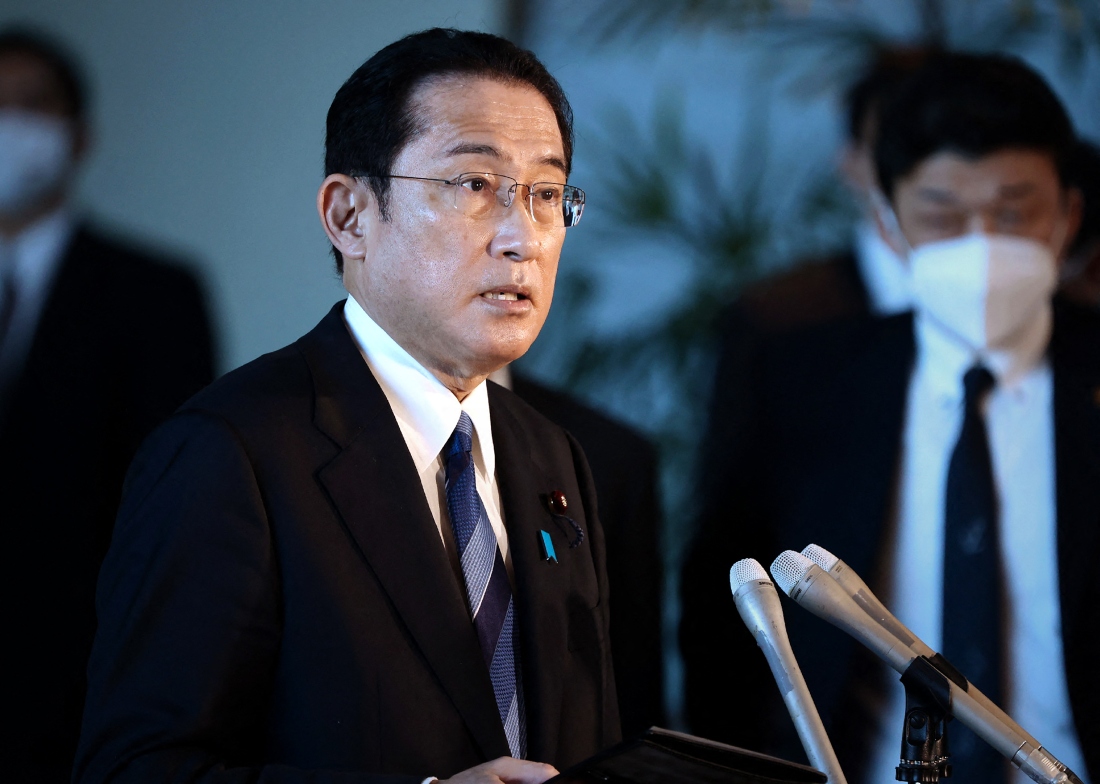
06:33: Four more blasts heard to the east of Ukrainian city of Mariupol: Reuters report.
06:26: Italy’s Prime Minister, Mario Draghi, condemns the Russian attack, describing it as ‘unjustified and unjustifiable.’
06:26: Ukraine police say 2 villages in Luhansk region have been seized.
06:23: Saudi stocks tumble as the trading session starts Thursday amid the Russia-Ukraine conflict.
Brent crude crossed $100 for the first time since 2014, rising 6.22 percent to $102.9 as of 10:07 a.m. Saudi time. US benchmark WTI went up to $97.59 a barrel.
06:10: Russia’s Defense Ministry says Ukraine’s air defense has been degraded.
06:06: Ukraine military says 5 Russian planes and 1 helicopter were shot down in Luhansk region – a claim Russia denies.
05:42: Ukraine’s emergency services say an ammunition depot in Kyiv is on fire
05:39: Ukraine’s border was attacked by Russian troops from Russia and Belarus, as well as Crimea.
05:37: US Foreign Secretary Antony Blinken says allies are united in responding to Russia’s invasion of Ukraine and strengthening NATO’S eastern flank
05:31: Ukraine military says its air force is repelling an air attack by the invading forces.
05:30: Britain’s Prime Minister Boris Johnson says Putin ‘has chosen a path of bloodshed’ in Ukraine.
05:21: Reuters report sirens heard in Ukrainian capital Kyiv.
05:20: German Chancellor, Olaf Scholz says the Russian military operation is ‘a glaring violation’ of international rights.
05:19: NATO ambassadors say they will hold an urgent meeting on the Russia invasion
05:16: Two blasts heard in Mariupol one after another, from an easterly direction according to Reuters.
05:15: US President Joe Biden says the US will continue to provide support and assistance to Ukraine and its people.
05:09: Ukrainian Foreign Minister Kulbela tweeted “The world must impose devastating sanctions on Russia.”
05:00: President of the European Commission Ursula Von Der Leyen strongly condemned Russia’s “unjustified attack on Ukraine.”
And she said “we will hold the Kremlin accountable.”
Adding: “In these dark hours, our thoughts are with Ukraine and the innocent women, men and children as they face this unprovoked attack and fear for their lives.”
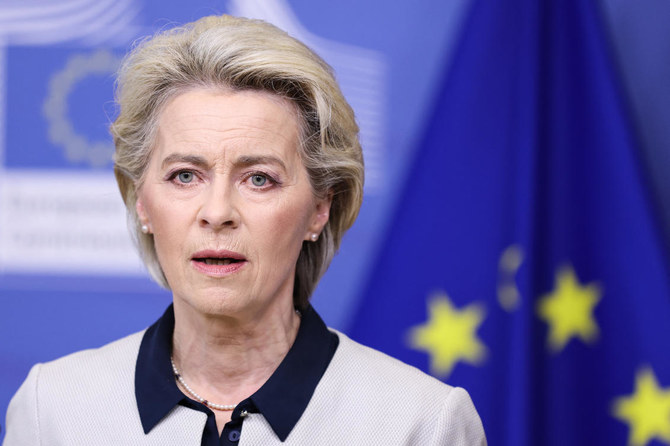
04:55: Russian-backed rebels say they had started the attack on the Ukraine-controlled town near Luhansk.
Elsewhere explosions are heard in Ukraine’s Kramatorsk.
04:54: Ukraine’s president tells people to stay at home as much as possible and urged them not to panic.
04:51: The Ukraine President announces the introduction of marital law across the country and says explosions have been heard in many of Ukraine’s cities.
04:48: Explosions heard in Ukraine’s Kharkiv, near the Russian border, news agency AFP reports.
04:46: Russia’s defense ministry says it is not targeting Ukrainian cities with missile or artillery strikes.
04:44: Kyiv mayor tells citizens to stay home after explosions heard in the Ukraine capital.
04:40: Moscow’s UN envoy says Russia is targeting what it calls the ‘junta in power in Kiev.’
04:39: Canadian Prime Minister Trudeau says his country “condemns in the strongest possible terms Russia’s egregious attack on Ukraine.
And he says his country will take additional action to stop Russia’s unwarranted aggression
04:37: Ukraine foreign ministry calls on allies to immediately activate package of new sanctions.
04:35: Artillery fire heard in Donetsk news agency Reuters reports.
04:35: Chinese envoy to the UN says China believes the door to a peaceful solution to the “Ukraine issue” has not been completely shut, and should not be shut
04:24: Ukraine calls on Russia and the UN ‘to stop the war.’
04:19: Gueterres describes the attack on Ukraine as ‘saddest moment in my tenure’ as secretary-general.
04:18: UN Secretary-General Gueterres tells Russia’s Putin: “In the name of humanity bring your troops back to Russia.”
04:12: Russian troops land in Mariupol and Odessa: IFX
04:11: Ukrainska Pravda news website says Ukrainian military command centers in Kyiv, Kharkiv have been attacked by missile strikes.
04:11: Ukraine closes airspace to civilian planes.
04:08: The French envoy to the UN condemns Russia for choosing war, and says Russia must be held accountable at UN security council.
04:07: Explosions heard in Ukraine’s Black Sea port Odessa according to the news agency AFP.
04:07: Ukraine’s ambassador to the UN tells the Russian UN envoy “there is no purgatory for war criminals, they go straight in hell.”
04:03: The Ukrainian Ministry of Infrastructure says passengers and staff evacuated from Kyiv airport.
04:00: The NATO chief condemns Russia’s ‘reckless and unprovoked attack’ on Ukraine.
03:11: Russia’s President Vladimir Putin says in case of any interference, Russia will react immediately: TASS
03:00: Russia’s President Vladimir Putin calls on Ukrainian soldiers to immediately lay down their weapons and go home: TASS


